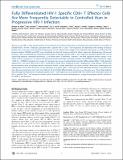| dc.contributor.author | Draenert, Rika | |
| dc.contributor.author | Rathod, Almas | |
| dc.contributor.author | Verrill, Cori L. | |
| dc.contributor.author | Stone, David R. | |
| dc.contributor.author | Johnston, Mary N. | |
| dc.contributor.author | Flynn, Theresa | |
| dc.contributor.author | Addo, Marylyn Martina | |
| dc.contributor.author | Davis, Benjamin Thomas | |
| dc.contributor.author | Gandhi, Rajesh Tim | |
| dc.contributor.author | Robbins, Gregory Kimball | |
| dc.contributor.author | Basgov, Nesli | |
| dc.contributor.author | Cohen, Daniel E. | |
| dc.contributor.author | Wurcel, Alysse Gail | |
| dc.contributor.author | Rosenberg, Eric Scott | |
| dc.contributor.author | Altfeld, Marcus | |
| dc.contributor.author | Walker, Bruce David | |
| dc.date.accessioned | 2011-12-24T04:53:04Z | |
| dc.date.issued | 2007 | |
| dc.identifier.citation | Addo, Marylyn M., Rika Draenert, Almas Rathod, Cori L. Verrill, Benjamin T. Davis, Rajesh T. Gandhi, Gregory K. Robbins, et al. 2007. Fully differentiated HIV-1 specific CD8+ T effector cells are more frequently detectable in controlled than in progressive HIV-1 infection. PLoS ONE 2(3): e321. | en_US |
| dc.identifier.issn | 1932-6203 | en_US |
| dc.identifier.uri | http://nrs.harvard.edu/urn-3:HUL.InstRepos:5978680 | |
| dc.description.abstract | Background: CD8+ T cells impact control of viral infections by direct elimination of infected cells and secretion of a number of soluble factors. In HIV-1 infection, persistent HIV-1 specific IFN-γ+ CD8+ T cell responses are detected in the setting of disease progression, consistent with functional impairment in vivo. Recent data suggest that impaired maturation, as defined by the lineage markers CD45RA and CCR7, may contribute to a lack of immune control by these responses. Methodology/Principal Findings: We investigated the maturation phenotype of epitope-specific CD8+ T cell responses directed against HIV-1 in 42 chronically infected, untreated individuals, 22 of whom were “Controllers” (median 1140 RNA copies/ml plasma, range less than 50 to 2520), and 20 “progressors” of whom had advanced disease and high viral loads (median 135,500 RNA copies/ml plasma, range 12100 to greater than 750000). Evaluation of a mean of 5 epitopes per person revealed that terminally differentiated CD8+ T cells directed against HIV-1 are more often seen in HIV-1 Controllers (16/22; 73%) compared to HIV-1 progressors (7/20; 35%)(p = 0.015), but the maturation state of epitope-specific responses within a given individual was quite variable. Maturation phenotype was independent of the HLA restriction or the specificity of a given CD8+ T cell response and individual epitopes associated with slow disease progression were not more likely to be terminally differentiated. Conclusions/Significance: These data indicate that although full maturation of epitope-specific CD8+ T cell responses is associated with viral control, the maturation status of HIV-1 specific CD8+ T cell responses within a given individual are quite heterogeneous, suggesting epitope-specific influences on CD8+ T cell function. | en_US |
| dc.language.iso | en_US | en_US |
| dc.publisher | Public Library of Science | en_US |
| dc.relation.isversionof | doi:10.1371/journal.pone.0000321 | en_US |
| dc.relation.hasversion | http://www.ncbi.nlm.nih.gov/pmc/articles/PMC1824710/pdf/ | en_US |
| dash.license | LAA | |
| dc.subject | immunology | en_US |
| dc.subject | immune response | en_US |
| dc.subject | HIV infection and AIDS | en_US |
| dc.title | Fully Differentiated HIV-1 Specific CD8+ T Effector Cells are More Frequently Detectable in Controlled than in Progressive HIV-1 Infection | en_US |
| dc.type | Journal Article | en_US |
| dc.description.version | Version of Record | en_US |
| dc.relation.journal | PLoS ONE | en_US |
| dash.depositing.author | Gandhi, Rajesh Tim | |
| dc.date.available | 2011-12-24T04:53:04Z | |
| dash.affiliation.other | HMS^Medicine-Massachusetts General Hospital | en_US |
| dash.affiliation.other | HMS^Medicine-Massachusetts General Hospital | en_US |
| dash.affiliation.other | HMS^Medicine-Massachusetts General Hospital | en_US |
| dash.affiliation.other | HMS^Medicine-Massachusetts General Hospital | en_US |
| dash.affiliation.other | HMS^Medicine-Massachusetts General Hospital | en_US |
| dash.affiliation.other | HMS^Medicine-Massachusetts General Hospital | en_US |
| dash.affiliation.other | SPH^Immunology and Infectious Diseases | en_US |
| dc.identifier.doi | 10.1371/journal.pone.0000321 | * |
| dash.authorsordered | false | |
| dash.contributor.affiliated | Davis, Benjamin | |
| dash.contributor.affiliated | Robbins, Gregory | |
| dash.contributor.affiliated | Addo, Marylyn Martina | |
| dash.contributor.affiliated | Wurcel, Alysse Gail | |
| dash.contributor.affiliated | Gandhi, Rajesh | |
| dash.contributor.affiliated | Rosenberg, Eric | |
| dash.contributor.affiliated | Altfeld, Marcus | |
| dash.contributor.affiliated | Walker, Bruce | |
| dc.identifier.orcid | 0000-0001-6122-9245 | |


